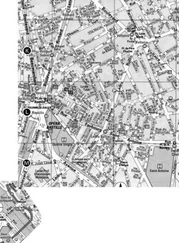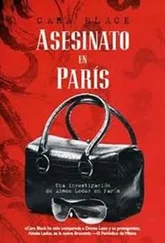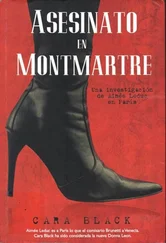“ Merci, monsieur,” she said, playing along.
The men kept walking and passed them. She heard their footsteps echoing on the metal stairs leading to winding corridors and, eventually, to the holding pens under the Tribunal. She could imagine the sweating stone walls, and the prisoners awaiting sentencing in cells little changed since the Reign of Terror.
“Can’t you do a quick search to see if there’s a report filed on missing Asian jade?”
“You’re looking for missing oriental art?” asked Lars. “You want me to check the list, you mean?”
She nodded.
He sat up, pulled at a drawer that stuck, then slammed it hard and it opened.
“A stolen Rodin sculpture in the 14th from narrow Impasse Nansouty near Parc Montsouris.”
“Try the 17th arrondissement.”
He thumbed through the file. The crinkling paper competed with the low whine of the saw in the background.
“What about missing jade?”
“Hmmm . . . a dope racket and bordello, but that’s as close as it gets in the 17th.”
Frustrated, she pulled out her map, studied it.
“My brother-in-law delivers meat to a boucherie in the 17th,” Lars said. “He always bitches that he can’t unload. One time he had to walk with a whole side of a cow through the narrow passage and an old lady fainted right on her poodle.”
She read the map, half listening to Lars, thinking of the threadlike streets of this village within a village, still beating with a provincial life of its own.
“Sorry, that’s it,” Lars concluded.
She exhaled with disgust, leaning against Lars’s grease-stained metal filing cabinet. If the jade was “hot,” no one would report it stolen.
“ Merci , Lars,” she said, and left his office.
SHE TRIED to make sense of what she’d learned. Regnier, under suspension, had gone rogue, which made him more dangerous. Pleyet, still a cipher, worked for the “Circle Line.” All along the quai, as brown leaves rustled past her on the gravel, she thought about Lars’s change of attitude after he had spoken those two words. She pulled off her leather glove and wrote down the last four digits of Lars’s password on her palm. She’d play with the numbers later.
Time was running out for René. She tried Commissaire Ronsard on her cell phone.
“The Commissaire’s in a meeting,” said a bored voice.
She tried Léo.
“Club Radio,” Léo answered.
“It’s Aimée, any luck with René’s phone, Léo?”
“ Désolée , so far the antenna’s picked up nothing.”
Aimée’s heart sank to her feet.
“They could have trashed it, or just not turned it on,” Léo said. “Keep your cell phone calls to a minimum, in case they try you.”
“ Merci, I’ll check with you later.”
She was stymied. The only person she knew of connected to Thadée was Sophie. Sophie had to know a detail, a name. Even if she didn’t realize she knew it. But she was in London. Aimée had to reach her. Besides the art gallery, watched by the police, the best place to look was in Sophie’s house.
Thursday Afternoon
AIMÉE MADE HER WAY toward the address, near Clichy, she’d found for Sophie. She passed small Indian shops selling suitcases out on the pavement as well as everything from manicure sets to bootleg tapes. Nestled in between them were Vietnamese florists, and discount clothing stores with jackets on racks bearing signs that read EVERYTHING UNDER 100 FRANCS, as they whipped in the rising wind.
Mothers wearing stylish black suits, or Muslim headscarves over dark robes, hurried little children to the école primaire , and a motor scooter putt-putted on the cobblestones waiting before a café doubling as a takeout for Turkish kebab frites sandwiches. She ordered a kebab frites , paid, and ate the steaming spiced lamb sandwich as she walked down the street.
Aimée found Sophie Baret’s stained-glass-paned front door in tree-lined Cité des Fleurs. The cobbled lane of nineteenth-century houses, each with its front garden, felt like another world: ornate pink brick façades with statuary carved over the lintels of two-story houses. A spill of sunlight illuminated the trellis-covered walkway to Sophie’s house.
Aimée knocked on the open door. “ Bonjour? ”
Something hissed, then crashed.
In the hall, Aimée saw a pink and orange-haired woman, wearing chunky black boots, and a tight, red rhinestone-trimmed dress under a faux fur orange jacket, lugging a snare drum and cymbals.
“ Pardon , Sophie lives here, right?”
“Some of the time,” said the woman, bumping into her. “I’m Mado, her sister. I housesit when she’s away.” The woman’s face was quite pretty despite the black kohl-lined eyes and red eyeshadow that matched her outfit.
Sisters? Two bookends that didn’t quite match. Mado looked the type who didn’t trust anyone not wearing eyeliner.
“I’d appreciate if you could give me her number in London, something came up.”
The cymbal crashed, causing the dog next door to bark.
“London . . . again?”
“She rushed there after the attack.”
Mado’s mouth widened. “Attack? My sister, the drama queen, does it again! She overeacts to everything,” Mado said. Then paused. “She’s not hurt or anything?”
“Someone broke into the gallery,” Aimée said. “But I’m worried that she fled to London.”
“Then she’s fine,” Mado said.
“But her ex, Thadée—”
“That scum! Sorry, we’ve got a rehearsal right now! There’s a chance a scout for the label will drop by,” she said. “The bass player’s waiting for me.”
A small Mini-Cooper with METALLOMIX spraypainted on it idled at the curb. The long-haired driver tooted the horn.
“Do you have her number in London?”
Mado shook her head as she edged down the walkway. “Shut the door for me, will you?”
Aimée closed it, leaving the thumb of her glove in the lock. Worried that Mado would notice, she blocked Mado’s view and handed her a card. But Mado gripped the drum case and shook her head.
“Put it in my jacket pocket, eh?”
“It’s important that I speak with her.”
Mado nodded, shoving the drum through the opened car door.
“Sophie’s in danger,” Aimée said, “Danger? According to her, that’s the only way to live.”
“You don’t understand,” Aimée said. But she was speaking to a closed car door.
The Mini roared down the lane.
Aimée knocked on the door of the neighboring house to ask about Sophie. No answer. She tried the small house on the other side. A smiling woman wearing an apron, holding a mop, opened the door.
“Bonjour, I’m. . . .”
“ Non fala française . . . Portugais !” the woman said, retreating.
Aimée returned to Sophie’s front door, pulled out her glove, and in ten seconds was inside. A pile of mail sat on a stool in the hallway. Water bills, gas notices, British Vogue , and postcards of upcoming exhibitions.
The angles and colors of the walls reminded her of a child’s drawing of a house. Mauve walls, terracotta tiles, and antique and 1960s retro furniture jumbled together. Marabou feathered scarves smelling of cigarettes, and an electric keyboard littered the couch in the small living area, indicating Mado’s presence. Aimée figured she slept there. A jam jar of wilted roses, whose pink petals were strewn over an old rattan table, gave her the impression little time was spent on housekeeping. Something she could relate to.
She identified Sophie’s room by its faint Arpège scent. A Vuitton suitcase, partially unpacked, sat on her rose silk duvet, with a bulging cosmetic bag inside. Sophie didn’t seem the type to run off without her makeup remover.
Читать дальше











